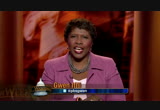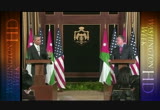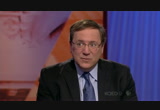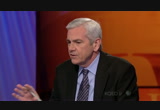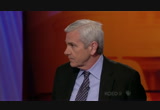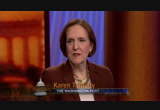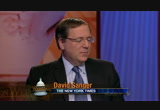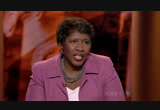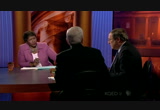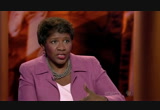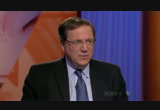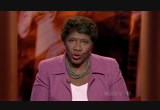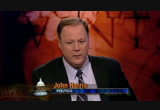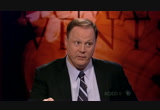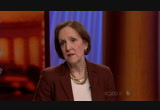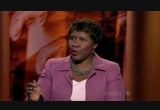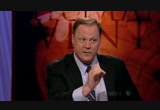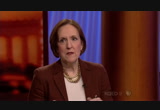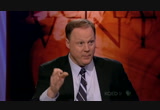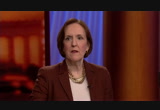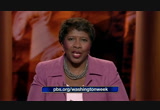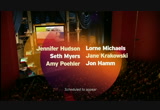tv Washington Week With Gwen Ifill PBS March 23, 2013 2:00am-2:30am PDT
2:00 am
efficient ways to power flight. >> and harness our technology for new energy solutions. >> around the globe, the people of boeing are working together to build a better tomorrow. > that's why we're here. >> additional funding is also provided by the annenberg foundation, the corporation for public broadcasting, and by contributions to your pbs . ations from viewers like you corporate funding is also provide bid prudential. once again, live from washington, moderator gwen ifill. gwen: good evening. it took him four years to get there, but when barack obama arrived in israel for the first time as president this week, he had what he called his homework .n hand on the list, healing a political rift with prime
2:01 am
minister benjamin netanyahu, winning over a skeptical and gently c, restarting the moribund middle east peace talks in part by appealing to israelis to see it from the palestinian point of iew. >> put yourself in their shoes. look at the world through their eyes. just as israelis built a state in their homeland, palestinians have a right to be a free people in their own land. gwen: but make no mistake, this was an emphatically pro-israel trip, especially when the president talked tough to two of the region's problematical leaders, presidents mahmoud ahmadinejad of iran and bashar .l-assad of syria >> i'm confident that assad will go. it's not a question of if, it's when. and so part of what we have to spend a lot of time thinking about is what's the aftermath of that and how does that work in a way that actually serves the syrian people?
2:02 am
gwen: and today he did some hand-holding with the leaders of jordan and turkey as well. not too much on his plate this week, guys. what was this trip designed to accomplish? >> the first thing was to seal up this perception that president obama has not had israel's interests front and center, and he seemed to succeed at that. in heretz this morning, they wrote, the most powerful man in the world arrived in the most threatened state in the world to promise love. hebrew, noted he spoke how much hebrew he used. and then at the end of his visit, brokered a phone call between prime minister netanyahu and the president of turkey, two countries that have been estranged since a turkish
2:03 am
boat on the way to help gaza was attacked by israeli commandos? gwen: so, tom, is this like woody allen says, 90% of life is showing up? just the president showing up was enough to paper over or fix a lot of the problems existing? >> well, he said some really interesting things from the israeli point of view. one of the very interesting things was going to escape a lot of people's attention is he reaffirmed support not just for the state of israel but for the idea of zionism. that was important to the israelis. it seemed to me he nudged a little bit closer to israel's position vis-a-vis iran. but the perception that bothered them tazz -- was not only that he was unsympathetic to israel but that the united states is disengaged, that the united states is no longer the player in the region that it once was. that's why i think this phone
2:04 am
call he brokered between netanyahu and the turkish leader is -- was so important because it put the united states back in the role of being a player in the middle east. >> and that wasn't just a perception. that was in fact the reality of obama in the first term. he did not want to put the credibility of his administration behind what he thought was a fool's erond -- errand, the middle east peace process. >> the big question going forward was, was this just a matter of perception? we're going to see here in the coming months whether he sends john kerry back with a really serious mission to do something between the israelis and palestinians and what does he follow up on with respect to turkey, syria, etc. the >> well, it looks like he's going to go back fairly early. and one thing interesting is
2:05 am
secretary of state clinton kept her distance from the israeli-palestinian issue. i think you will see secretary kerry in the middle of this. clinton may have been thinking about the pobbletd of running for president someday, john kerry has been there, done that. and heard in that clip where prime minister netanyahu said the iranians would not move unless there was a credible threat of military action, and you heard the president come out very clearly saying containment is not my policy, they're not going to get a weapon no matter what we need to go do. and i think even though he's said that before, they needed to hear it right there and the iranians needed to hear it right there. >> while he was over there, there were some pretty horrific accusations coming out of syria, from both sides, that chemical weapons had been used. how credible was that? and what does that do to the
2:06 am
whole international posture on syria? >> you know, the accusations were made very generally about chemical weapons being muse -- used but there was no mention of nerve gas or sarin or any of the serious ones. something interesting is the old soviet military doctrine, chemical weapons included anti-riot weapons, tear gas. if the only weapon that was used was tear garks make in the syrian context that is considered a chemical pape -- weapon. it is certainly not in the u.s. view. >> one nch the reasons i think this is particularly important though is president obama has made it clear there's only one thing that would bring him into the syrian conflict. he's been under a lot of pressure from a lot of different sides. the real use of chemical weapons to move to hezbollah or hamas, he repeated that again
2:07 am
during his public talks in israel. that means that he sort of committed himself. so if they determine that this was just tear gas or a pesticide or something he was -- has to be able to say that doesn't count, that's not what i'm talking about. gwen: the president spent part of the day with king abdullah of jordan. ne thing very interesting he said -- >> what we are saying, that the arab spring is behind us, we in jordan are looking now at arab summer for us all, which means that we all have to roll up our sleeves. it's going to be a bumpy and difficult road, but i'm very encouraged with the process and i am sea -- am very excited about the future. gwen: excited about the arab summer? that sounds like more than a notion, especially with king
2:08 am
abdullah having thousands of syrian refugees in jordan and they need our help. >> he went straight to that point and you mentioned that the president did announce he's going to push for $200 million in aid to jordan. i actually thought that that press conference was one of the weaker points of the president's trip. he seemed to be to be a little uneasy. gwen: the president did? >> i thought the president seemed a little bit defensive in that press conference. >> well, he's got a lot to be defensive about when it comes to this. think of the early summer of the arab spring, the president showed up ste -- at the state department and gave a big speech about how much money the united states was going to offer to help the arab spring. i looked at how much of that money was gone. two years later, less than
2:09 am
half. some of the proposals never even made it to congress. i think the president didn't want to risk congress voting it down the handing out $200 million and so forth, perfectly nirkse but we're not talking about what the united states did after the fall of the soviet union. not talking about the marshall plan. we're talking about tiny amounts of money for huge humanitarian problems. >> and abdullah said he expects the bill to be a billion dollars by the end of this year. gwen: really? i thought it was interesting when the president seemed to get a little bit defensive in both press conferences. asked what he was going to do about the middle east peace process, he said, hey, hts -- htstard -- it's hard. and then about intervening, "hey, it's hard." there is a reason to be defensive as far as actions the united states has or has not taken so senator >> the president knew this week
2:10 am
is the 10th anniversary of the invasion of iraq the that hangs over every single decision that administration makes and it particularly hangs over any question about interintention. -- interest ervention. >> and also about the credibility of these threats. president obama sees his role as extraction. >> and he doesn't want to be the one to go to the u.n. and say i have the evidence of the chemical weapons when it turns out there isn't. >> and he also committed himself about if they use chemical weapons. he hasn't said exactly what he would do. but chemical weapons, you don't just pick them up and bring them out of the country. they're in old, leaky containers and you can kill more people moving them around than you can leaving theam in place. gwen: a timing question. one of the disagreements the president and netanyahu had
2:11 am
going -- going into this was about timing, when iran would be able to get a nuclear weapon. the president said only a week ago, we think it will be about a year. and they agreed to disagree quietly. >> that's one way to look at that time, but another perspective, the president actually put a time line on iran getting a nuclear weapon and that put him in contrast to the position of the u.s. intelligence community which does not present this as a question of time. they present it as a question of political will, the decision to build a bomb. and president obama sort of -- the israelis on the other hand do present it strictly has a matter of time. at what point will iran have the enrichment capability that it will be able to produce a weapon without us doing anything about it? it seemed to me the president moved a little bit toward the israeli view.
2:12 am
>> the president has never said he would stop at capability, only a weapon. it's a big difference. gwen: as netanyahu said, we are both on the same page when it comes to our intelligence assessment, which i get the feeling is a carefully negotiated term >> and one they have used before. toming indicates, -- as tom indicates, though, when will they make a decision. gwen: we'll see. there were a lot of moving parts on the domestic front in week as well. congress passed a budget bill that would stave off another government shutdown for now. it struggled to reach an agreement on new gun laws, rejecting an assault weapons ban and taking tiny steps toward tightening background checks. political leaders in and out of congress rushed to catch up with rapidly shifting public pinion on same-sex marriage. and republicans looked inward to find out what went wrong in 2012. >> people want us to be bold. and i think this it is true. this is an unprecedented thing
2:13 am
for a national party to put their cards on the table face up, but this is what we're willing to do to build our party. i think it was necessary. i think people wanted the report to be real. they wanted it to be honest. they wanted it to be, if it had to, raw and maybe a few pieces of china needed to be broken. gwen: words. they called themselves stuffy old men, took real pokes at themselves. but did it go beyond that, karen? >> well, it was an after-action report. the r.n.c. had put together a commission and they had done thousands of interviews. the bottom line, he said the party is in a cull decak, reached a point where they're only talking to themselves. it spelled out a lot of technical fixes, more outreach to minorities, women, young people. they need to get up to speed on technology. they should move their convention a little bit
2:14 am
earlier, have fewer primary debates. gwen: things they can't always necessarily control. >> but the things the party can control are the technical things. what the party can't do is set a new direction on ideas and that is really the challenge for the republicans at this point, but that is going to require choices being made by the actual leaders of -- of their party. gwen: here's an example, john. in the immigration knish -- issue. in this report reince priebus said there should be comprehensive immigration reform and there is a gong -- gang of them on capitol hill trying to come up with this. is there movement underway? >> to underscore karen's point, technical issues, better computers, but the heart is the ideological one. the bold language in that clip, it's a lot harder to follow with bold action. immigration reform?
2:15 am
the nub question is do you support a pathway to legalization, to citizenship? so immediately after the statement there he was pressed by reporters. "well, it's not my job to get into policy." that's the whole heart tv and to me it actually raises another question. with respect to priebus, a nice, decent, intelligent man, but really who cares what he thinks? it's not where the real action of rebuilding the party is going to take place. the one thing is whether it's even possible for parties to have these kind of formidable party chairmen like ron brown after the debacle in 1998. we just don't think of party chairmen as having that kind of influence in this era. the role of parties is too limited. >> and in fact a lot of the recommendations were about outcourse is -- outsourcing.
2:16 am
aye lot of the things the party used to do, to friends and allies. >> the president did say we have not been as inclusive as we should be the that does suggest a different idea ological approach. >> and one of the biggest developments of the week, the senator from kentucky, rand paul, gave a speech in which he didn't actually use the word citizenship for illegal immigrants but he implied that he is there. the first major figure from that side of the party to really come out and endorse this idea. >> when you think about the tea party, it was only a few months ago that after the president's state of the union address there was a republican party response, there was a tea party response.
2:17 am
gave you a sense of how decided they were on these issues. can you see a merger in the next year or two that actually gets engineered that begins to neutralize this decision? and same-sex marriage will be up there in front of the supreme court next week, another one they've never quite sealed up on. >> i'm not sure the party did -- can do that. the only thing that could really bring these different sections together say person, a figure that they can sort of speak to all the strands of conservativism and republicanism that are out there. gwen: well, let's talk about a person, a figure. on the issue of gay marriage, we saw a ren senator last week saying i've decided it's a good idea. hillary clinton actually bringing up the tail end ncht parade among democrats saying she thinks it's a good idea. are they following public
2:18 am
opinion or leading it? >> i think there is no question that in this country over the last generation there has been a hugely consequential, historic proportions, cultural revolution on this issue of gay marriage. the "washington post" poll shows it has majority support. >> 58%. >> and in this, the politicians are not leading indicators, they're lagging indicators. with all due respect to hillary clinton, i'm sure her view in the videotape was sincere but i find it inconceivable that her position has actually clade from 2008. what has changed is the political calculus of course risk. in the democratic party it's riskier to keep your safe position from yaur -- four years ago than to do what she did. obviously the calculus on the republican side is different but we are still seeing a lot
2:19 am
of republicans saying look, times have changed and generations have changed. gwen: didn't we think times were going to change on gun matters too after newtown in we saw the assault weapons ban, which honestly didn't have that good a chance of passage but now completely pushed to the side? >> the senate is going to take up the gun legislation when they come back from their recess next blo -- next month. it is pretty clear from harry reid's statements this week that the more ambitious measures such as an assault weapons ban are not going to get through the senate. i think the politics of the issue remain what they always were, think -- which is that there is broad public support for a lot of these measures but it's geographically intense in some areas and not in others. but i also think on one side there is an intensity on the issue, the anti-gun control side where it's not a driving
2:20 am
issue and the memories are a lot shorter on the other side. >> there is also broad public support for a compromise on the fiscal front. is there any indication that in the coming months that will be part of this recalculation on the part of the republican leadership and the democratic leadership? >> there is some indication just looking at white house rhetoric. president obama in the winter had been saying look, it's not a matter of whether i can have a round of golf with speaker boehner, the only thing that's going to change is if those guys flatly change their position. we've seen all this outreach in the last couple weeks. he showed an openness, even i would say eagerness to sort of reopen the grand bargain talks. the fundamental political calculus is that it's easy to talk about what a grand bargain would look like in private, but
2:21 am
still virtually impossible to do in public because the bases shall -- of both parties are opposed to the essential elements, entitlement reform and deficit reduction. >> but the difference between this grand bargine and the one two summers ago would be that you're in a world where the deficit might naturally be declining as well the would that make any difference? >> the problem is i don't think you can -- you still have to have revenue for this to be acceptable. ches -- i think it's clear that there won't be increased rates. that's not going to happen. so can this happen? can they tackle tax reform? >> you are also saying medicare costs are beginning to level off. they don't know why, but it's happening. for the first time in years, the democratic senate is
2:22 am
actually considering a budget and that means there is possibly a good chance there is going to be a conference committee between the republican house and the democratic senate on the budget that could provide another opening of a bit of a window to again put some of the bigger ideas on the table the gwen: it's also possible that the sequestration, the word i hate to use, but the across the board budget cuts that people said weren't going to make a ig effect, they didn't immediately, are starting to kick in, drirnings drip, drifment >> but they passed 9 resolution to keep the government going for the rest of the year. gwen: well, we'll be watching. thank you, everyone. our conversation has to end here for now but continues online in our "washington week" webcast extra, where among other things we'll consider lessons learned 10 years after he u.s. went to war in iraq. keep up with daily developments, including next
2:23 am
week's supreme court arguments on gay marriage, over on "the pbs newshour" , and we'll see you right here next week on "washington week" -- and for everyone who sell brarktse have a happy and blessed pass oh-fer. -- passover. good night. >> corporate funding for "washington week" is provided by -- >> we asked people a simple question. how old is the oldest person you have snone a lot of people have known someone who lived well into their 90's. but one thing that hasn't changed? the official retirement age.
2:24 am
the question is, how do you make sure you have the money you need to enjoy all of these years? >> additional corporate funding for "washington week" is provided by boeing. .he annenberg foundation, additional funding is provided by the corporation for public broadcasting and by contributions to your pbs station from viewers like you. contributions to your pbs sthere's this island -- and it's got super-cute kangaroos.
2:27 am
barrow island has got rare kangaroos. ♪ chevron has been developing energy here for decades. we need to protect their environment. we have a strict quarantine system to protect the integrity of the environment. forty years on, it's still a class-a nature reserve. it's our job to look after them. ...it's my job to look after it. ♪
2:28 am
2:29 am
hi, i'm leslie sbrocco. welcome to "check, please! bay area." the show where residents talk about their favorite restaurants. this week, production supervisor and food dude jeff kramer works on commercials, features, and tv shows. his mantra is hurry up and wait, so when it comes to the good food at his unusual venue, he doesn't mind waiting for what he calls a show-stopping meal. mike stephen works out any kinks in his restaurant. there are two ways to la
292 Views
IN COLLECTIONS
KQED (PBS) Television Archive
Television Archive  Television Archive News Search Service
Television Archive News Search Service 
Uploaded by TV Archive on

 Live Music Archive
Live Music Archive Librivox Free Audio
Librivox Free Audio Metropolitan Museum
Metropolitan Museum Cleveland Museum of Art
Cleveland Museum of Art Internet Arcade
Internet Arcade Console Living Room
Console Living Room Books to Borrow
Books to Borrow Open Library
Open Library TV News
TV News Understanding 9/11
Understanding 9/11
